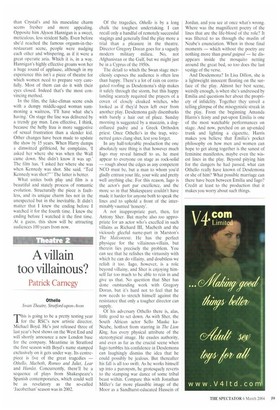A villain too villainous?
Patrick Camegy
Othello Swan Theatre, Stratford-upon-Avon !This is going to be a pretty testing year 1 for the RSC's new artistic director, Michael Boyd. He's just released three of last year's best shows on the West End and will shortly announce a new London base for the company. Meantime in Stratford the first season with Boyd's name stamped exclusively on it gets under way. Its centrepiece is five of the great tragedies — Othello, Macbeth. Romeo and Juliet, Lear and Hamlet. Concurrently, there'll be a sequence of plays from Shakespeare's Spanish contemporaries, which could well be as revelatory as the so-called `Jacobethan' season was in 2002. Of the tragedies. Othello is by a long chalk the toughest undertaking. I can recall only a handful of remotely successful stagings and generally find the play more a trial than a pleasure in the theatre. Director Gregory Doran goes for a vaguely modern military milieu. No, not Afghanistan or the Gulf, but we might just be in a Cyprus of the 1950s.
The detail to which the Swan stage mercilessly exposes the audience is often less than happy. There's a lot of rain on corrugated roofing as Desdemona's ship makes it safely through the storm, but this happy landing scarcely required the prayers of a coven of closely cloaked witches, who looked as if they'd been left over from another play. Desdemona gaily disembarks with barely a hair out of place. Sunday morning is suggested by a muezzin, a dogcollared padre and a Greek Orthodox priest. Once Othello's in the trap, wirenetted gates clang shut, lest you forget.
In any half-tolerable production the one absolutely sure thing is that however much Iago may reveal himself to us, he must appear to everyone on stage as rock-solid — rough about the edges as any competent NCO must be, but a man to whom you'd gladly entrust your life, your wife and pretty well anything else, For this reason, Iago is the actor's part par excellence, and the more so in that Shakespeare couldn't have made it harder for anyone both to speak the lines and to uphold a front of the interminably vaunted honesty'.
A not inappropriate part, then, for Antony Sher. But maybe also too appropriate for an actor who's excelled in such villains as Richard III, Macbeth and the viciously gleeful name-part in Marston's The Malcontent. He has the perfect physique for the villainous-villain, but therein lies precisely the problem. You can see that he relishes the virtuosity with which he can do villainy, and doubtless we relish it too. Iago, however, is a role beyond villainy, and Sher is enjoying himself far too much to be able to rein in and give us that. No question that Sher has done outstanding work with Gregory Doran, but it's hard not to feel that he now needs to stretch himself against the resistance that only a tougher director can supply.
Of his adversary Othello there is, alas, little good to set down. As with Sher, the South African actor Sello Maake kaNcube, hotfoot from starring in The Lion King, has every physical attribute of the stereotypical image. He exudes authority, and even as far as the crucial scene when Iago tumbles his confidence in Desdemona can laughingly dismiss the idea that he could possibly be jealous. But thereafter his fall is all too swift. As he works himself up into a paroxysm, he grotesquely reverts to the stamping war dance of some tribal beast within. Compare this with Jonathan Miller's far more plausible image of the Moor as a Sandhurst-educated Hussein of
Jordan, and you see at once what's wrong. Where was the magnificent poetry of the lines that are the life-blood of the role? It was filtered to us through the muslin of Ncube's enunciation. When in those final moments — which without the poetry are nothing more than grand guignol — he disappears inside the mosquito netting around the great bed, so too does the last vestige of the verse.
And Desdemona? In Lisa Dillon, she is a lightweight innocent floating on the surface of the play. Almost her best scene, weirdly enough, is when she's undressed by Emilia and questions her about the propriety of infidelity. Together they unveil a telling glimpse of the misogynistic streak in the play. From the beginning Amanda Harris's feisty and put-upon Emilia is one of the most watchable performances on stage. And now, perched on an up-ended trunk and lighting a cigarette, Harris makes you believe that Emilia's pocket philosophy on how men and women can hope to get along together is the sanest of feminine manifestos, maybe even the wisest lines in the play. Beyond pitying him for the dangers he had passed, what can Othello really have known of Desdemona or she of him? What possible marriage can there have been between Emilia and Iago? Credit at least to the production that it makes you worry about such things.


















































































 Previous page
Previous page